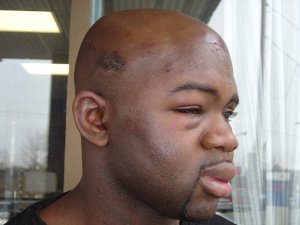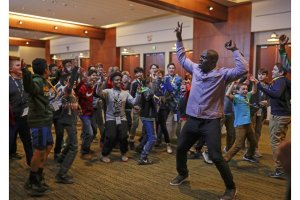When Orlando Bowen, the former CFL player, watches the video of George Floyd pleading for air, he holds his own breath and relives his own nightmare with police.
“It was a flashback of sorts, because I am him,” Bowen said.
“It’s only by God’s grace or universal design why my life didn’t end, like that.”
Bowen, who is Black, is referring to a dark night in his life in the spring of 2004. At the the time, he was a successful linebacker, having three years under his belt with the Toronto Argos and a season with the Hamilton Tiger Cats.
His heart, he also says, was in community service — speaking in schools and even partnering with Peel Regional Police as a liaison for the Black community.
But life was about to take a drastic turn.
While waiting for his teammates in a Mississauga parking lot to celebrate a new extension he had just signed with the Ti-Cats, Bowen says he was approached by two men.
“One guy says, ‘Hey man, what you got? Got any drugs?’” Bowen remembers. After saying ‘no’, Bowen returned to the phone call he’d been having. But the men, who turned out to be plainclothes Peel police officers, weren’t so easily dissuaded and asked to search him.
Bowen said he complied and when nothing was found, in one surreal moment, everything escalated.
“They ended up grabbing me, punching me, delivering knee strikes,” Bowen recalls, punching his hand. “I’m saying, ‘Oh my gosh! What did I do? I didn’t do anything!…Talk to me! Like, what’s happening?’”
They never responded to him verbally, he said. They just kept punching.
“All I could think was, ‘God! Don’t let me die like this man, I got so much in me to give!” said Bowen.
His life was spared that night, but forever changed. The brutal injuries he suffered ended his CFL career, with a concussion meaning his days on the gridiron were over.

Photos taken of Orlando Bowen’s head injuries the morning after the incident.
Orlando Bowen

But when Bowen looks back, the now 44-year-old says the heaviest part is watching a similar scene of police brutality play out in the video of 46-year-old Floyd, dying–16 years later.
“As much as I knew it wasn’t me on the ground … I saw myself, like it was me,” Bowen said.
“It was taking me back to the moment where I was pleading to the universe and to God to intervene.”

It’s the reliving of these kinds of trauma and repeated viewing of high-profile incidents of racism and police brutality that can be deeply traumatic for Black people, says Monnica Williams, Canada Research Chair for Mental Health Disparities at the University of Ottawa.
“It’s been a huge drain on everyone that I know who is part of that community,” says Williams.
“We’re seeing people who look like us, our children, our brothers, our uncles, our fathers, laying dead on the road like roadkill, with no minimal amount of dignity.
“It’s unspeakable…it dehumanizes us, it makes us feel like we’re not worth anything, like our lives don’t matter.”
As for Bowen, he, who had before done racial sensitivity training for Peel police, was eventually arrested by the cops that night and taken to jail on assault and drug possession.
Stunned by the charges, Bowen said the drugs were planted on him by police and that they had assaulted him.
A year later, he was acquitted of all charges after one of the arresting officers was charged and later convicted of drug trafficking. An Ontario court judge ruled the testimony of police to be “incredible” and unworthy of belief.
But for Bowen, months of court battles, torment and what he felt was ultimately racial discrimination had left its scars.
“I remember having a hard time sleeping, probably averaging about 20 minutes of sleep per night,” said Bowen.
“It made me hyper-aware. I always went to bed last in my house. I often slept in between the two entrances to our house — front door entrance and the back door, just in case they came to, you know, finish.”
Williams says for Black people, especially Black men, navigating a world where your body is perceived as a threat can be incredibly taxing on Black mental health.
“Any encounter with law enforcement if you’re a Black person is potentially a life-threatening event,” Williams explained.
“You’re constantly having contact with law enforcement, and each time you have that contact, that’s a moment of anxiety, a moment where you have to look a certain way, talk a certain way, work really hard to alleviate white suspicion, fears, that you’re doing something wrong–and to be under that kind of stress, that pressure cooker all the time? It becomes unbearable.”
William says the psychological effects of these encounters and racism ripple.
“Everyday discrimination, major discrimination, covert discrimination, microagressions — all of these are tied to mental health problems that include anxiety, depression, post-traumatic stress disorder, substance use and even suicide,” said Williams.
“Every condition out there where we’ve looked at this, racism has either caused this or made it worse.”
Bowen said he has seen some of that pain first hand now, working with youth in the community. Pain, that often goes untreated.
“Feelings of anger…feelings of insignificance, insecurity, feeling like you don’t belong, feeling like you don’t matter, feeling like it doesn’t matter what you do, you have very little control over what’s possible for you,” Bowen lists them off.
“When people get to those states of being or feeling…people act out of those beliefs, and then they become somewhat self-fulfilling, that you end up going down a path.”
Williams whose research focus at the university is in mental health and disparities and cultural competence in research and healthcare, says Black people often have no where to turn for help with handling these emotions, with culturally sensitive mental health supports and services, meager.
“Black Canadians are incredibly underserved, our mental health needs are not being met,” said Williams. “This is a province-wide, nation-wide problem. The clinicians who provide the care for the public, they’re not trained in how to work with people of colour in general, much less Black people. Those resources are very few, very thin.”
That gap is what fuels Bowen and his charity, ”One Voice, One Team”, where he works with and shares his experience with thousands of young people–turning his pain into hope.
“We have opportunities and I think an obligation to do something to protect people’s mental health,” Bowen said. “To try to create positive outlets and opportunities for them to be connected, their voice to be heard, for them to have safe and brave spaces…”

Orlando Bowen now heads the youth-leadership charity, One Voice, One Team.

Bowen not only inspires with his words and story, but with his actions.
A few years ago, he wrote a public letter of forgiveness to the two officers he said who wronged him.
He “wasn’t angry,” Bowen said, reflecting on the decision. Rather, he chose to see the officers as people who needed help, who are hurting and broken “in a system that is also hurting, that needs help”.
More importantly, he says, the decision to forgive was for him to move on and flourish.
“What I realized was the forgiveness wasn’t even necessarily for them, but it was for us, for me, for my family who perhaps may have been in a position to hold on to some things, to the emotion of the moment where we can’t get to what we’ve been designed to do if we did that,” said Bowen.
“There’s a bigger purpose and a bigger plan, I’m convinced of that.”
© 2020 Global News, a division of Corus Entertainment Inc.
